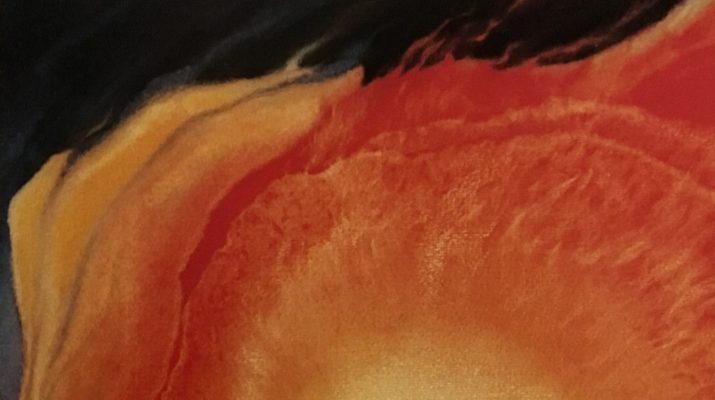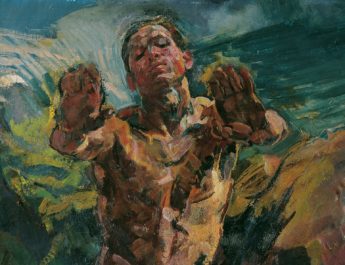Exodus 33:12-23
Proper 24A
BibleHub
12 MosesA saidB to the Lord,C
Notes on verse 12a
A “Moses” = Mosheh. From mashah (to pull out in a literal or figurative sense, to draw out) OR from Egyptian mes or mesu (child, son i.e. child of…). This is Moses – the one drawn out from the water, which is to say, rescued. If derived from the Egyptian, his name would share a root with Rameses and Thutmose.
B “said” = amar. This is to speak, say, answer, command, promise, report.
C “Lord” = YHVH. From havah (to be, become) or hayah (to come to pass, become, be). This is the name of the God of Israel, the self-existent and eternal one, the tetragrammaton. This pronunciation has been lost to time so “Lord” is generally used in its place.
“See,D you have said to me, ‘Bring upE this people,’F but you have not let me knowG whom you will sendH with me.
Notes on verse 12b
D “see” = raah. This is to see in a literal or figurative sense so stare, advise, think, view.
E “bring up” = alah. This is to go up, approach, ascend, be high, be a priority; to arise in a literal or figurative sense.
F “people” = am. From amam (to darken, hide, associate; creating shadows by huddling together). This is people or nation. It can be used specifically for a tribe, collectively of troops or armies, or figuratively to refer to a flock of animals.
G “know” = yada. This is to know, acknowledge, advise, answer, be aware, be acquainted with. Properly, this is to figure something out by seeing. It includes ideas of observation, recognition, and care about something. It can be used causatively for instruction, designation, and punishment.
H “send” = shalach. This is to send out, away, send for, forsake. It can also mean to divorce or set a slave free.
Yet you have said, ‘I know you by name,I and you have also foundJ favorK in my sight.’L
Notes on verse 12c
I “name” = shem. May be from sim (to put, place, set). This is name, fame, renown. A name was thought to indicate something essential about a person – something about their individuality. So, this word can also mean honor, authority, or character.
J “found” = matsa. This is to find, catch or acquire. It can also mean to come forth or appear. Figuratively, this can mean to meet or be together with.
K “favor” = chen. From chanan (beseech, show favor, be gracious; properly, to bend in kindness to someone with less status). This is grace, favor, kindness, beauty, precious.
L “sight” = ayin. This is eye in a literal or figurative sense so eye, appearance, favor, or a fountain (the eye of the landscape).
13 Now ifM I have found favor in your sight, pleaseN showO me your ways,P so that I may know you and find favor in your sight. Consider,Q too, that this nationR is your people.”
Notes on verse 13
M {untranslated} = na. This particle is used for requests or for urging. It can be we pray, now, I ask you, oh. This is the same “na” in “hosanna.”
N “please” = na. Same as {untranslated} in v13. See note M above.
O “show” = yada. Same as “know” in v12. See note G above.
P “ways” = derek. From darak (to tread, march, to walk. Can also mean affixing a string to a box since one needs to step on it to bend it in the process; so also an archer). This is a road as a thing that is walked on. Can be used figuratively for the path that one’s life takes or how one chooses to live one’s life.
Q “consider” = raah. Same as “see” in v12. See note D above.
R “nation” = goy. From the same root as gevah (the back, person, or body); related to gev (among); related to gaah (to rise up). This is nation or people. Often used to refer to Gentiles or foreign nations. It can also be used figuratively for a group of animals. This is where the Yiddish “goy” comes from.
14 He said, “My presenceS will goT with you, and I will give you rest.”U
Notes on verse 14
S “presence” = paneh. From panah (to turn, face, appear). This is face in a literal or figurative sense. It could be face, presence, anger, respect. It can also be used of God to indicate divine favor or presence.
T “go” = halak. This is go, come, walk. It is walk literally and figuratively and includes people and animals. It can be used figuratively for one’s moral life – how we walk according to God’s way or against it. It can also refer to the walk of life as in the course one’s life takes, the choices we make, etc.
U “give…rest” = nuach. This is to rest, calm, camp, free, place, remain, satisfy, settle, station, or wait. It is rest and so implies settling down in a literal or figurative sense. This is perhaps the root verb of the name “Noah.”
15 And he said to him, “If your presence will not go, do not bring us up from here. 16 For how shall it be known that I have found favor in your sight, I and your people, unless you go with us? In this way, we shall be distinct,V I and your people, from everyW people on the faceX of the earth.”Y
Notes on verses 15-16
V “be distinct” = palah. 7x in OT. This is to distinguish in a literal or figurative sense. It can also be to sever, set apart, or show self to be marvelous.
W “every” = kol. From kalal (to complete). This is all or every.
X “face” = paneh. Same as “presence” in v14. See note S above.
Y “earth” = adamah. From the same as adam (man, humankind); perhaps from ‘adom (to be red). This is ground, earth, soil as red, or land.
17 The Lord said to Moses, “I will also doZ this thingAA that you have asked,BB for you have found favor in my sight, and I know you by name.”
18 Moses said, “Please showCC me your glory.”DD
Notes on verses 17-18
Z “do” = asah. This is to make, do, act, appoint, become in many senses.
AA “thing” = dabar. From dabar (to speak, declare, discuss). This is speech, a word, a matter, an affair, charge, command, message, promise, purpose, report, request. It is a word, which implies things that are spoken of in a wide sense.
BB “asked” = dabar. Related to “thing” in v17. See note AA above.
CC “show” = raah. Same as “see” in v12. See note D above.
DD “glory” = kabod. From kabad (to be heavy, weighty, burdensome). This is weighty. Figuratively, glorious, abundant, riches, honor, splendor – a reference to one’s reputation or character. This word is often used to describe God and God’s presence.
19 And he said, “I will make allEE my goodnessFF passGG beforeHH you
Notes on verse 19a
EE “all” = kol. Same as “every” in v16. See note W above.
FF “goodness” = tub. From tob (to be pleasing, to be good). This is goodness, gladness, something that is good. It can also be beauty, welfare, or joy.
GG “pass” = abar. This is to pass over or cross over. It is used for transitions, whether literal or figurative. It can also mean to escape, alienate, or fail. This is the root verb from which “Hebrew” is drawn.
HH “before” = paneh. Same as “presence” in v14. See note S above.
and will proclaimII before you the name, ‘The Lord,’ and I will be graciousJJ to whom I will be gracious and will show mercyKK on whom I will show mercy.
Notes on verse 19b
II “proclaim” = qara. This is to call or call out – to call someone by name. Also used more broadly for calling forth.
JJ “be gracious” = chanan. Related to “favor” in v12. See note K above.
KK “show mercy” = racham. From racham (compassion, tender love, womb, compassion; the womb as that which cherishes the fetus); from the same as rechem (womb). This is to love, fondle, have mercy, have or show compassion.
20 But,” he said, “you cannotLL see my face, for no oneMM shall see me and live.”NN
Notes on verse 20
LL “cannot” = lo + yakol. Yakol is to be able, endure, overcome, prevail.
MM “one” = adam. Related to “earth” in v16. Perhaps from adam (to be red, make ruddy); related to adamah (see note Y above). This is man, humankind, also Adam’s name. It refers to a human individual or humanity.
NN “live” = chayay. 17x in OT. This is to live, save life, or revive.
21 And the Lord continued,OO “See,PP there is a placeQQ by me where you shall standRR on the rock,SS
Notes on verse 21
OO “continued” = amar. Same as “said” in v12. See note B above.
PP “see” = hinneh. From hen (lo! Behold! If, though; an expression of surprise). This is to draw attention, show suddenness or surprise, or to emphasize the importance of the coming statement. See! Lo! Behold!
QQ “place” = maqom. From qum(to arise, stand, accomplish, establish, abide; rising against, getting up after being sick or asleep, arising from one state to another, becoming powerful, or rising for action; standing in a figurative sense). This is a standing, which is to say a spot or space a place. It can also refer to a locality or a physical/mental condition. HaMaqom is also a Jewish name for God – the place, i.e. the Omnipresent One.
RR “stand” = natsab. This is to station, appoint, establish, take a stand.
SS “rock” = tsur. From tsur (to confine, cramp, or bind in a literal or figurative sense; to besiege, assault, or distress). This is rock, stone, cliff, boulder, rocky. It can also be a refuge, a way to refer to God.
22 andTT while my glory passes by I will putUU you in a cleftVV of the rock, and I will coverWW you with my handXX until I have passed by;
Notes on verse 22
TT {untranslated} = hayah. Related to “Lord” in v12. See note C above.
UU “put” = sim. Related to “name” in v12. See note I above.
VV “cleft” = neqarah. 2x in OT. From naqar (to dig, pick, quarry, or penetrate; gouging out eyes, having eyes pecked out, and a quarry being dug). This is a hole, crevice, fissure, or cavern.
WW “cover” = sakak. This is to cover or overshadow. It could also be to hedge or fence it. Figuratively, this could be to defend, protect, or join together.
XX “hand” = kaph. From kaphaph (to bend – from a root meaning curve or bend down). This is palm of the hand or sole of the foot, footstep, grasp. Figuratively, it can also mean power.
23 then I will take awayYY my hand, and you shall seeZZ my back,AAA but my face shall not be seen.”BBB
Notes on verse 23
YY “take away” = sur. This is to turn aside in a literal or figurative sense – to depart, decline, rebel, remove, or withdraw.
ZZ “see” = raah. Same as “see” in v12. See note D above.
AAA “back” = achor. From achar (to be behind, delay, be late, procrastinate, continue). This is the back, behind, backward, time to come. It can also refer to facing to the north or the west
BBB “seen” = raah. Same as “see” in v12. See note D above.
Image credit: “Churinga (pure light, glory of God)” by Frank Wesley.




